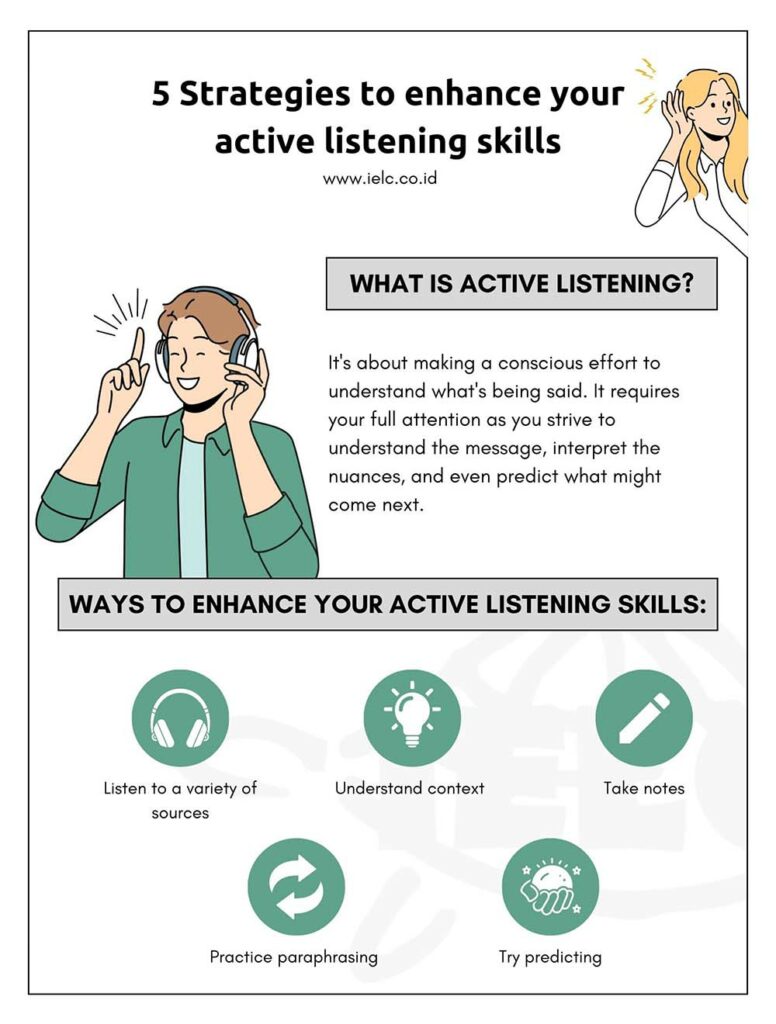
5 Strategies to enhance your active listening skills
Welcome, English learners!
Do you ever feel like you can understand English pretty well when you’re reading or writing, but when it comes to listening, things seem to get a little tricky?
You’re not alone! This is a common challenge faced by many of us on our English language journey.
Enter the realm of active listening!

Passive listening
Passive listening can be a great initial step in your English learning journey. As you expose yourself to English speech regularly – maybe through songs, podcasts, or even background television – you’re effectively tuning your ears to the unique sounds and rhythm of the language. It’s a simple, effortless way to accustom your brain to the English language patterns.
Active listening
Active listening, on the other hand, is more direct and intentional. It’s about making a conscious effort to understand what’s being said. It requires your full attention as you strive to understand the message, interpret the nuances, and even predict what might come next. Yes, it can be a bit of a workout for your brain, but it’s an excellent way to sharpen those listening skills!
In this article, we’ll focus on active listening. So, without further ado, let’s dive right in into tips and tricks to enhance your active listening skills!
Active Listening is like your secret weapon. It’s more than just letting English words flow into your ears; it’s about truly understanding, engaging with, and responding to what you hear.
So, are you ready to transform your English listening skills through active listening?
Passive listening vs active listening
Before we dive into the deep end, let’s start with the basics – what exactly do we mean by ‘passive’ and ‘active’ listening?
1. Listen to a variety of sources
We all have our go-to sources, right? You might have a favorite English podcast or radio show that you tune into regularly. Or maybe there’s an English movie or TV series you’ve watched again and again. While these sources are fantastic and bring us comfort, they might be limiting our listening growth without us even realizing it! Start exploring different types of media. Podcasts, audiobooks, news broadcasts, YouTube channels, movies, and even English music. Each offers a unique listening experience and exposes you to different styles of spoken English.
You should also expand your cultural exposure! English, while a single language, comes in many flavors thanks to its global reach. American, British, Canadian, Australian, South African – each English-speaking region has its unique accent and colloquialisms. Listening to different accents enhances your understanding and prepares you to interact with English speakers from around the world!
2. Understand context
Let’s talk about the power of context. You know that magical moment when you don’t understand a word, but you can still make an educated guess about what it means?
That’s your brain using context clues! Understanding context is a major component of enhancing your English listening skills.
Begin by identifying the overall topic of the conversation or speech. If you’re listening to a podcast episode about climate change, for example, you can anticipate certain keywords or themes related to that topic. This helps in understanding the broader picture even if you miss a few words here and there.
If you come across an unfamiliar word or phrase, don’t panic. Instead, try to gather clues from the words or sentences around it. This is where your inference skills come in. Often, you can deduce the meaning based on what’s being discussed.
Bottomline is you don’t need to understand every single word to understand the overall message. By focusing on context, you can navigate your way through complex discussions or fast-paced conversations with more confidence and comprehension!
3. Take notes
While listening, jot down important ideas, new vocabulary, or anything that stands out. This not only helps to keep track of the content but also trains your mind to identify crucial elements in a conversation or lecture.
It’s important to note (ha! Notice the pun?) that we speak at a much faster rate than we write, so feel free to use abbreviations or symbols when you take notes!
After listening, revisit your notes and try to expand them using your memory. This reinforces what you’ve just listened to and strengthens your recollection. It’s also a great time to look up any unfamiliar words or phrases.
Remember, note-taking is more than just a passive recording process; it’s an active learning tool that helps your comprehension and retention. Don’t worry if your notes look messy or disorganized – they’re not meant to be a perfect transcript but a reflection of your understanding.
4. Practice paraphrasing
Paraphrasing is the skill of taking someone’s words and reshaping them into your own while keeping the original meaning intact. It’s a phenomenal way to absorb and engage with what you’re listening to, and also a great test to see if you’ve fully grasped the content.
After listening to a segment of English dialogue or a story, try to rephrase what you’ve heard using your own words. It’s like retelling a story but in your unique style. This can really enhance your understanding of the content and the language.
Whenever possible, substitute words in the original sentence with their synonyms. This way, you not only get to exercise your vocabulary but also understand the flexibility of the English language.
If you’re listening to long-form content, try summarizing it. Can you express the main points of a 30-minute podcast in a few sentences? This will not only test your understanding but also train your brain to sift through information and keep what’s important.
5. Try predicting
Ah, the art of predicting. No, I’m not suggesting you to transform into a fortune teller, but did you know that making predictions can significantly improve your English listening skills? It encourages active listening and engages you with the content on a deeper level. Let’s dive into how you can apply it:
- Anticipate the content
Suppose you’re about to listen to a podcast titled “The Impact of Social Media on Teens,” what do you expect to hear? Cyberbullying? Screen time? Mental health? By predicting the content, you prime your brain to listen for specific information, aiding in comprehension.
- Guess what comes next
While listening, try to predict what the speaker will say next. This pushes you to understand the speaker’s point of view and follow their thought process, enhancing your grasp of the language.
- Predict word choices
This can be a fun challenge! Try to anticipate specific words the speaker might use based on the topic or context. Not only does it help you stay engaged, but it also expands your vocabulary as you consider different possibilities.
Your predictions won’t always be accurate – and that’s perfectly okay! The goal isn’t to get it right every time, but to actively engage with the content and boost your comprehension skills!
Summary
And there you have it! Five practical and engaging strategies to enhance your English listening skills through the power of active listening. From exposing yourself to a variety of English sources to trying your hand at predicting, each technique provides a unique way to challenge yourself and make your learning journey more effective and exciting!
Keep practicing, stay curious, and embrace the adventures and challenges that come with learning English!
Next steps
Do you want to speak English with confidence?
Most people lack confidence when they speak English. They are afraid to make mistakes and are embarrassed to speak in front of others.
This is because they have been taught English the wrong way!
Most English courses waste your time and money on useless exercises that don’t bring results. Even worse, they teach you bad habits that are very difficult to unlearn.
As a result, you become confused and lack confidence. This is wrong!
At IELC, we teach English the right way
Our goal is to get you speaking in English with fluency and confidence as fast as possible. We want to give you the skills you need to fulfil your potential!
Our experienced teachers will guide you along every step of the learning process to ensure that you are not wasting your time, money, and energy on useless language exercises & wrong methods.
Our courses
With our modern campus and technology, we are equipped to provide the best possible courses for children, teens, and adults, including:
Online and on campus IELTS courses
Online and on campus TOEFL PBT courses
Online and on campus TOEFL iBT courses
We offer our classes in group classes or private classes.
No matter what your goals are, our team will help you achieve these goals by providing you with Indonesia’s best English courses!
Talk to our team today to get your FREE consultation and take your first step towards success.
Sincerely,

IELC Academic Director
